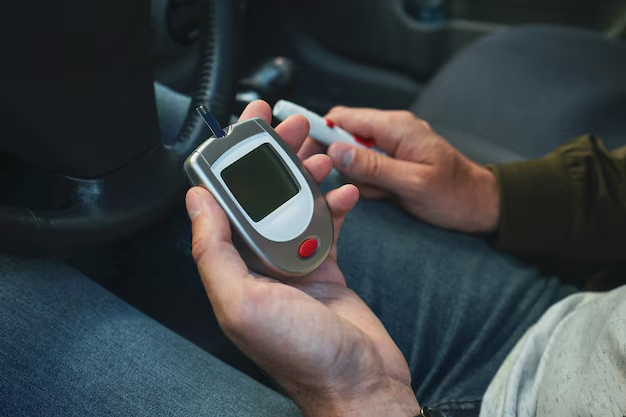Your Guide to Does Medicare Cover Diabetic Supplies
What You Get:
Free Guide
Free, helpful information about Medicare Insurance and related Does Medicare Cover Diabetic Supplies topics.
Helpful Information
Get clear and easy-to-understand details about Does Medicare Cover Diabetic Supplies topics and resources.
Personalized Offers
Answer a few optional questions to receive offers or information related to Medicare Insurance. The survey is optional and not required to access your free guide.
Exploring Medicare Coverage for Diabetic Supplies
Living with diabetes requires careful management and a steady supply of various medical items, from blood sugar monitors to test strips. If you're navigating the intricacies of Medicare, you may be asking, "Does Medicare cover diabetic supplies?" Fortunately, the short answer is yes—but understanding the specifics can empower you to better manage your healthcare needs and expenses.
Medicare Part B and Diabetic Supplies
Medicare Part B is your go-to source for diabetic supplies. It covers essential items like blood sugar monitors, glucose test strips, lancets, and more, but there are conditions. Generally, Medicare Part B covers:
- Blood Sugar Monitors: Beneficiaries are entitled to a monitor and a renewal every five years.
- Test Strips and Lancets: Supply limits apply. For insulin-dependent patients, usually up to 300 test strips and 300 lancets every three months. Non-insulin users typically get up to 100 test strips and 100 lancets in the same period.
- Insulin Pumps: Considered durable medical equipment (DME), they are covered if deemed medically necessary.
To access these benefits, you must use a Medicare-enrolled supplier and have a prescription from your healthcare provider. Remember, while Part B covers much, you'll often pay 20% of the Medicare-approved amount after meeting your Part B deductible.
Considerations Under Medicare Part D
While Medicare Part B covers many diabetic supplies, Medicare Part D focuses on prescription drug coverage, including insulin and certain diabetes medications. Each Medicare drug plan varies, so ensuring your plan caters to your specific needs is crucial.
Financial Assistance Programs
Navigating Medicare can sometimes feel overwhelming, especially when managing chronic conditions like diabetes. Understanding and utilizing other financial assistance programs can significantly relieve any of the costs that Medicare may not fully cover. Consider:
Medicaid: For eligible low-income individuals, Medicaid may cover additional costs not handled by Medicare, particularly useful for those struggling with medication and doctor visit expenses.
State Pharmaceutical Assistance Programs (SPAPs): Many states offer programs that help pay for prescription drugs, and each has its own criteria for eligibility.
Extra Help: A program to assist those with limited resources pay for Medicare prescription drug plan costs, including premiums and deductibles.
Engaging with these resources can decrease financial stress, allowing more focus on health and wellbeing.
Holistic Financial Strategy
The complexity of managing health costs while living with a chronic condition cannot be understated. Beyond government aid, consider a broader financial strategy:
Budgeting: Track healthcare expenses proactively for better control and foresight.
Debt Relief Options: For those overwhelmed with healthcare debts, consulting with a financial advisor on consolidation or relief solutions can be beneficial.
Credit Card Solutions: Some credit cards offer medical-specific terms or rewards that could offset healthcare expenses.
These options, combined with robust government programs, create a foundation for more stable financial health.
Key Resources to Explore 💡
- Medicaid: Comprehensive coverage for low-income individuals.
- State Pharmaceutical Assistance Programs (SPAPs): State-specific aid for prescription drugs.
- Extra Help: Assistance with Medicare prescription drug plan costs.
- Financial Planning: Budgeting, debt relief, and credit solutions tailored to healthcare needs.
Empowering yourself with the right knowledge ensures not only better healthcare outcomes but also a more manageable financial journey. Whether through Medicare or supplementary assistance programs, solutions are available to ensure you're supported every step of the way.
What You Get:
Free Medicare Insurance Guide
Free, helpful information about Does Medicare Cover Diabetic Supplies and related resources.

Helpful Information
Get clear, easy-to-understand details about Does Medicare Cover Diabetic Supplies topics.

Optional Personalized Offers
Answer a few optional questions to see offers or information related to Medicare Insurance. Participation is not required to get your free guide.


Discover More
- Am I Elgible For Medicare
- Am I Enrolled In Medicare
- Am I Qualified For Medicare
- Are Adult Diapers Covered By Medicare
- Are Chemotherapy Drugs Covered By Medicare Part d
- Are Colonoscopies Covered By Medicare
- Are Covid Tests Covered By Medicare
- Are Cpap Machines Covered By Medicare
- Are Cpap Supplies Covered By Medicare
- Are Dental Implants Covered By Medicare
